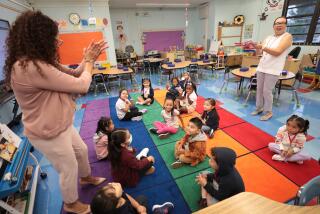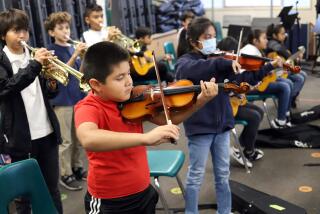Schools Focus on Trimming 1st-Grade Class Sizes
VENTURA — School district officials agreed Tuesday to try to trim the size of first-grade classes beginning in September, even though they will be hard-pressed to find the facilities to do it.
Ventura Unified School District board members told Supt. Joseph Spirito to consider hiring as many as 25 teachers as part of a statewide, $771-million class-size reduction initiative.
“My feeling is, let’s move as fast as we can toward reducing class size,” board member John Walker said.
The state grant, which would pay schools $650 per student for every class that has no more than 20 pupils, would not cover the full cost of hiring new teachers and creating new classroom space, district officials say.
Officials estimate that the district would fall short $223,650 if it just shrank the size of first grade in 17 elementary schools from an average of more than 29 students to 20. In the long run, the state plan calls for cutting the size of first- through third-grade classes, which could stick the district with an annual tab of more than $600,000.
But Joseph Richards, assistant superintendent for business services, said the district could pay for the program with reserve money and other revenues.
“We don’t anticipate having to cut any programs as a result of implementing this,” he said.
Like other districts, Ventura plans to begin tackling the class size problem in the first grade before phasing in other grades in the next few years. Some first-graders may enter classes with just 20 students in the fall, while others may not attend smaller classes until February, when district officials hope to complete the transition.
What may hold up the process is the fact that district officials must create about 24 new classrooms--a daunting task when many elementary schools are already filled to capacity.
Officials said Tuesday they will talk with individual schools about how to create new classrooms, but cautioned that many of the options involve sacrifice.
To save on space, district officials said, teachers could “team teach,” meaning that two teachers would work in a large classroom of 40 students. Schools could also convert libraries and computer rooms into classrooms, a move that some officials said parents might protest.
“[The options] are not pleasant,” Walker said.
Although the state has also agreed to give schools $25,000 per new first-grade classroom to make modifications or buy portable facilities, officials said the district may not receive any portables by February because the demand statewide is soaring.
Board members also asked Spirito and his staff to study the possibility of putting schools on a year-round, multitrack schedule, requiring students to attend classes in four shifts. Such a schedule would create 25% more classroom space districtwide, because only 75% of the district’s students would be attending school at one time.
But district officials said they could not adopt such a schedule for at least two years, and some board members conceded that it might be hard to sell it to parents.
“Multitrack is not highly desirable,” Walker said.
Despite the extensive planning needed to reduce class size, Ventura educators said putting fewer students in a class will make it easier for children to pick up reading and math skills.
“It is probably the best thing since sliced bread,” Spirito said.
More to Read
Sign up for Essential California
The most important California stories and recommendations in your inbox every morning.
You may occasionally receive promotional content from the Los Angeles Times.









